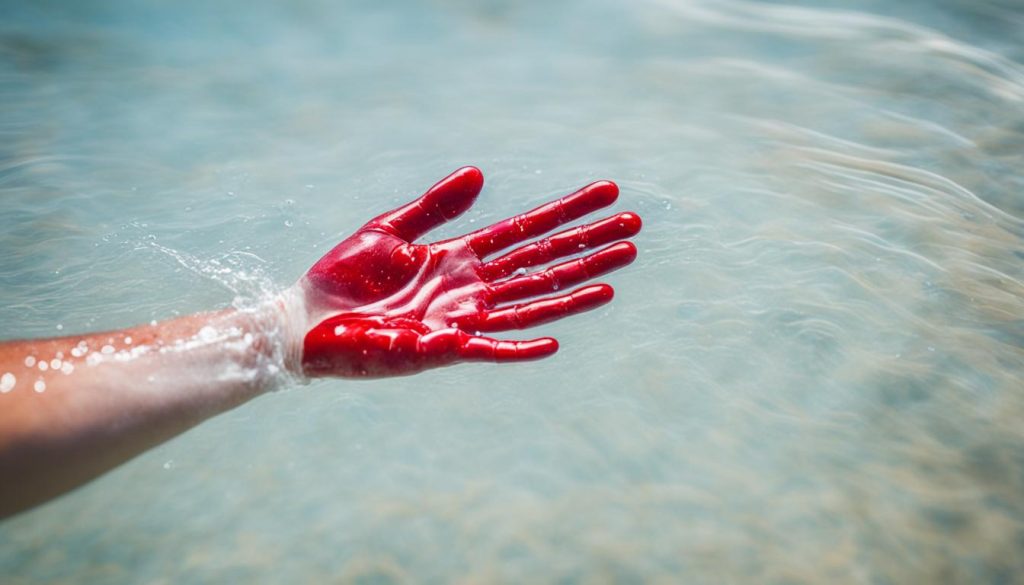Imagine enjoying a leisurely swim in the ocean, feeling the gentle waves lap against your skin. Suddenly, you feel a sharp, stinging sensation on your leg. Panic sets in as you realize you’ve been stung by a jellyfish. What do you do now?
Knowing how to treat a jellyfish sting is crucial for anyone who spends time in the ocean or near coastal areas. The pain and discomfort caused by a jellyfish sting can range from mild irritation to severe burning sensations. It’s essential to take immediate action to alleviate the discomfort and prevent further complications.
So, are you prepared to handle a jellyfish sting? Do you know the right steps to take for quick relief? If not, don’t worry. In this article, we will provide expert advice on treating jellyfish stings and offer tips for finding immediate relief. From first aid essentials to natural remedies, we have you covered. Get ready to arm yourself with the knowledge you need to handle jellyfish stings with confidence.
Key Takeaways:
- Knowing how to treat a jellyfish sting is essential for anyone who spends time in the ocean or near coastal areas.
- Act quickly when stung by a jellyfish to minimize pain and prevent complications.
- Follow proper first aid steps, such as rinsing the affected area and removing any tentacles.
- Consider natural remedies for additional relief, such as vinegar and baking soda solutions.
- Always seek medical attention if symptoms worsen or if you experience an allergic reaction.
Jellyfish Sting First Aid: Immediate Steps to Take.
When you first encounter a jellyfish sting, it’s crucial to act quickly to minimize the pain and potential complications. In this section, we will outline the immediate steps you should take to provide effective first aid for a jellyfish sting. From rinsing the affected area to removing any tentacles, we will guide you through the necessary actions to take for immediate relief and prevention of further irritation.
1. Get out of the water: If you get stung by a jellyfish while swimming, move to a safe area on the shore to prevent additional stings or further injury.
2. Rinse the affected area: Use seawater or warm water to gently rinse the affected area for at least 15 minutes. Avoid using freshwater, as it may worsen the sting.
3. Remove tentacles: Carefully remove any visible tentacles from the skin using tweezers, gloves, or a plastic card. Avoid touching the tentacles with bare hands to prevent additional stings.
4. Treat the sting site: Apply vinegar, if available, to the sting site for about 30 seconds. Vinegar helps neutralize the venom and prevent its further release. If vinegar is not available, you can use a baking soda paste (mix baking soda with seawater) as an alternative.
5. Soothe the pain and reduce swelling: Apply a cold pack wrapped in a cloth or a bag of ice to the sting site to reduce pain and swelling. Avoid applying ice directly to the skin.
6. Take over-the-counter pain relief: If needed, you can take over-the-counter pain medications like ibuprofen or acetaminophen to alleviate discomfort. Follow the instructions on the packaging and consult a healthcare professional if you have any concerns.
7. Seek medical attention: If the symptoms persist, worsen, or if you experience difficulty breathing, chest pain, or signs of an allergic reaction, seek immediate medical attention.
Note: It’s important to remember that while these steps can provide initial relief, they may not completely eliminate all symptoms. Jellyfish stings can vary in severity, and individual reactions may differ. If you’re uncertain or the sting is severe, always seek medical assistance.
Preventing jellyfish stings
Although it’s not always possible to prevent jellyfish stings, there are some measures you can take to minimize your risk:
- Stay informed: Check local beach or coastal advisories for jellyfish sightings or warnings.
- Wear protective clothing: Consider wearing a rash guard or dive suit to protect your skin from jellyfish tentacles.
- Swim in designated areas: Stick to areas where lifeguards are present and where the risk of jellyfish encounters may be lower.
- Avoid touching jellyfish: Even beached or dead jellyfish can still sting, so it’s best to stay away from them.
- Be cautious in murky water: If the water is not clear, it may be difficult to spot jellyfish, so exercise caution when swimming.
- Use protective lotions: Some sunscreens or lotions may provide a protective barrier against jellyfish stings, but their effectiveness varies.
By following these steps and taking preventive measures, you can minimize the risk of jellyfish stings and enjoy your time in the ocean with peace of mind.
Natural Remedies for Jellyfish Sting Relief.
If you prefer natural remedies or want additional relief after administering first aid, this section will provide you with various options. We will explore natural remedies that can help reduce swelling, relieve itching, and soothe the affected area.
“Natural remedies provide effective relief and can be easily prepared at home.”
1. Vinegar Solution:
Vinegar is a popular remedy for jellyfish stings. Its acidic properties help neutralize the venom, providing quick relief. Here’s how to use it:
- Thoroughly rinse the affected area with vinegar.
- Leave the vinegar on the skin for 15 minutes.
- Rinse the area with warm water.
2. Baking Soda Paste:
Baking soda is known for its soothing properties and can help alleviate the discomfort caused by a jellyfish sting. Follow these steps to make a baking soda paste:
- Mix 1 tablespoon of baking soda with enough water to form a paste.
- Apply the paste to the affected area.
- Leave it on for 10-15 minutes before rinsing it off.
3. Aloe Vera Gel:
Aloe vera gel has anti-inflammatory properties and can provide relief from the pain and swelling caused by a jellyfish sting. Here’s how to use it:
- Extract fresh aloe vera gel from the leaf.
- Apply the gel directly to the sting site.
- Leave it on for 20-30 minutes before rinsing it off.
4. Tea Tree Oil:
Tea tree oil is a natural antiseptic and can help prevent infection in the affected area. Follow these steps to use tea tree oil for jellyfish sting relief:
- Dilute a few drops of tea tree oil in a carrier oil, such as coconut oil or olive oil.
- Gently apply the mixture to the sting site.
- Leave it on for 30 minutes before rinsing it off.
Remember, these natural remedies can provide temporary relief, but it’s important to seek medical attention if the symptoms worsen or if you experience an allergic reaction.

A Comparison of Natural Remedies for Jellyfish Sting Relief
| Remedy | Properties | Application |
|---|---|---|
| Vinegar Solution | Neutralizes venom | Rinse affected area with vinegar for 15 minutes |
| Baking Soda Paste | Soothing and anti-inflammatory | Apply baking soda paste to the affected area |
| Aloe Vera Gel | Anti-inflammatory | Apply fresh aloe vera gel directly to the sting site |
| Tea Tree Oil | Antiseptic | Dilute tea tree oil in a carrier oil and apply to the sting site |
Conclusion.
In conclusion, proper jellyfish sting treatment is crucial for those who spend time in the ocean or near coastal areas. By following the correct first aid steps and considering natural remedies, you can significantly alleviate the pain and discomfort caused by a jellyfish sting. Remember to seek medical attention if your symptoms worsen or if you experience an allergic reaction. With the knowledge provided in this article, you will be better equipped to handle a jellyfish sting and enjoy your beach time without worry.
FAQ
How should I treat a jellyfish sting?
The first step in treating a jellyfish sting is to rinse the affected area with seawater or vinegar to remove any remaining tentacles. Avoid using freshwater, as it can worsen the sting. After rinsing, carefully remove any tentacles using tweezers or a credit card. Apply a topical jellyfish sting relief cream or hydrocortisone cream to alleviate itching and reduce inflammation. Seek medical attention if the pain is severe, the sting covers a large area, or if you experience any allergic reactions.
What should I do if I get stung by a jellyfish?
If you get stung by a jellyfish, the first thing to do is to remove yourself from the water to prevent further stings or exposure. If tentacles are still attached, avoid rubbing or scraping them off and instead, rinse the area thoroughly with seawater or vinegar. Next, carefully remove any tentacles using tweezers or a credit card. Apply a cold pack or immerse the affected area in hot water to help alleviate the pain. Seek medical attention if necessary, especially if you experience severe symptoms or have been stung multiple times.
Are there any natural remedies for jellyfish sting relief?
Yes, there are several natural remedies that can provide relief from a jellyfish sting. Applying a vinegar solution or a paste made of baking soda and seawater to the affected area can help neutralize the venom and soothe the skin. Aloe vera gel, tea tree oil, and witch hazel are also known for their calming and healing properties. Be sure to do a patch test before applying any natural remedy and discontinue use if you experience any adverse reactions.
How can I prevent jellyfish stings?
To minimize the risk of jellyfish stings, it is best to avoid swimming in areas where jellyfish are known to be present. If you do venture into the water, consider wearing a protective swimsuit or rash guard to reduce skin exposure. Additionally, swimming with a buddy and staying within designated swimming areas can help ensure prompt assistance in case of an emergency. Always follow beach or lifeguard warnings and pay attention to local jellyfish advisory notices.

